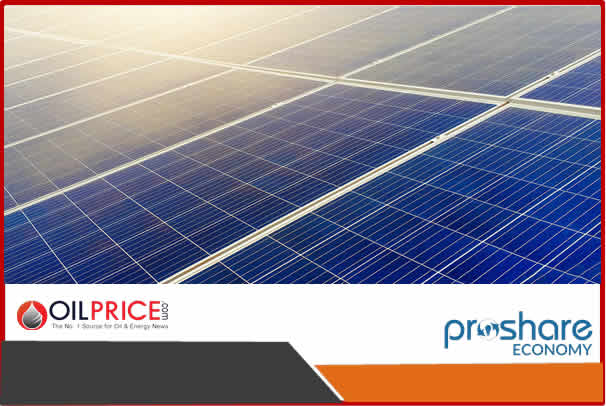Tuesday, May 14, 2019 / 05:52PM / By Nick Cunningham for Oilprice.com
Renewable energydeployment stalled out last year, raising alarm bells about the pace of theclean energy transition.
In 2018, total deployment of renewable energy stood at about 180 gigawatts(GW), which was the same as the previous year. It was the first time since 2001that capacity failed to increase year-on-year, according to the International Energy Agency (IEA).
Adding 180 GW of clean energy is a massive total, but still falls short of whatis needed to clean up the electricity sector. It equates to roughly 60 percentof what is needed each year in order to meet long-term climate goals, the IEAsaid. The agency said that the world needs to add about 300 GW of renewableenergy each year through 2030 in order to meet the targets laid out in theParis Climate Agreement.
Worse, last year, CO2 emissions from energy rose 1.7 percent, setting anotherrecord high at 33 Gigatonnes. So, while emissions need to decline sharply, theyhaven’t even flattened out yet. Renewable energy continues to grow, but so doesdemand for oil and gas.
"The world cannot afford to press "pause" on the expansion ofrenewables and governments need to act quickly to correct this situation andenable a faster flow of new projects," Fatih Birol, the IEA’s ExecutiveDirector, said in a statement.
"Thanks to rapidly declining costs, the competitiveness of renewables isno longer heavily tied to financial incentives. What they mainly need arestable policies supported by a long-term vision but also a focus on integratingrenewables into power systems in a cost-effective and optimal way. Stop-and-gopolicies are particularly harmful to markets and jobs," Birol added.
For the last four years, growth of wind had slowed, but the gap was made up byfaster growth from solar. The difference in 2018 was that solar’s exponentialgrowth flattened out. The reason for that lies in China, where the governmentpared back incentives on solar in order to cut expenditures and cope with gridintegration challenges, the IEA said. Still, China added 44 GW of solar lastyear, the most by far out of any other country and nearly half of the 97 GWglobal total. But that was down from 53 GW that China installed in 2017.
Costs continue to fall, making renewable energy the cheapest option in manymarkets, which should ensure strong growth going forward. In the U.S., wind andsolar are now cheaper than operating existing coal plants in much of thecountry. In fact, in April, renewable energy surpassed coal in terms of electricity generation for thefirst time, accounting for 24 percent of the total, compared to coal’s 20percent market share.
But, despite the momentum, the transition is not fast enough. A new UN report finds that the world is facing a mass die-off ofbiodiversity, with as many as one million plant and animal species at risk ofextinction. Also, the world is on track to blow through its carbon budget within 12 years.
Because of this urgency, a wave of new policies supporting a faster roll out ofelectric vehicles and renewable energy is inevitable. At the state level,renewable energy mandates are proliferating. In the Democratic primary for president,candidates are trying to outdo each other in terms of ambition on clean energyand climate change. For instance, what was once considered an extreme position,such as banning oil and gas drilling on public lands, has nowbecome a mainstreamposition in the Democratic Party, at least for the candidates running forpresident.
Another example of the shifting Overton window came in late April when formerTexas Congressman and presidential contender Beto O’Rourke recently called for $5 trillion in spending over the next 10 yearsin an effort to cut emissions to zero by 2050. It’s ambitious by any measure,but faced some pushback for not going far enough, which says a lot aboutthe growing concern about climate change. In fact, climate change ranked as thetop issue for Democratic voters, according to a recentpoll.
The oil and gas industry has enjoyed a golden era under the Trumpadministration, but it may only be temporary.

Latest Report From IEA
Renewable capacity growthworldwide stalled in 2018 after two decades - IEA ... – May 06,2019
Related News
1. CleanEnergy In The Policy Mix; Renewables To Account For 16% Of Total Energy GeneratedBy 2030
2. Dr.Sam Amadi, Dafe Akpeneye and Other Experts Set to Facilitate the ESQ Energy andPower Workshop
3. BUAand Wartsila Oy of Finland Sign 48MW Power Project for Sokoto Line 3
4. ShouldWe Rethink Nuclear Power As A Source Of Power Production?
5. 1.67mCustomers Metered As At Q4 2018 - NBS
6. AllOn Partners The Nigeria Climate Innovation Center
7. PowerSupply Crossed The 4,000MWh Threshold In 19 Out of The 30-day Review Period
8. RECALL:Completion Of World's Largest Combined Cycle Power Plants In Record Time
9. AnAverage of 78,917MWh of Power Generated in Q3 2018 - NBS
10. ElectricityIs Too Expensive In Nigeria
11. ShellDocked As Nigerian Oil Community Wins Court Judgment in The UK
12. OilSupply Shortages Countered By Trade War – OIR 100519
13. SaudiExports Send Oil Prices Falling – OIR 070519
14. NNRC,Order Paper Initiative, Others, Concerned Over Delays in Oil and Gas Reforms
15. HasThe Oil Rally Reached Its Limit? - OIR 030519
 Lagos, NG • GMT +1
Lagos, NG • GMT +1











 3786 views
3786 views








 Sponsored Ad
Sponsored Ad
 Advertise with Us
Advertise with Us









